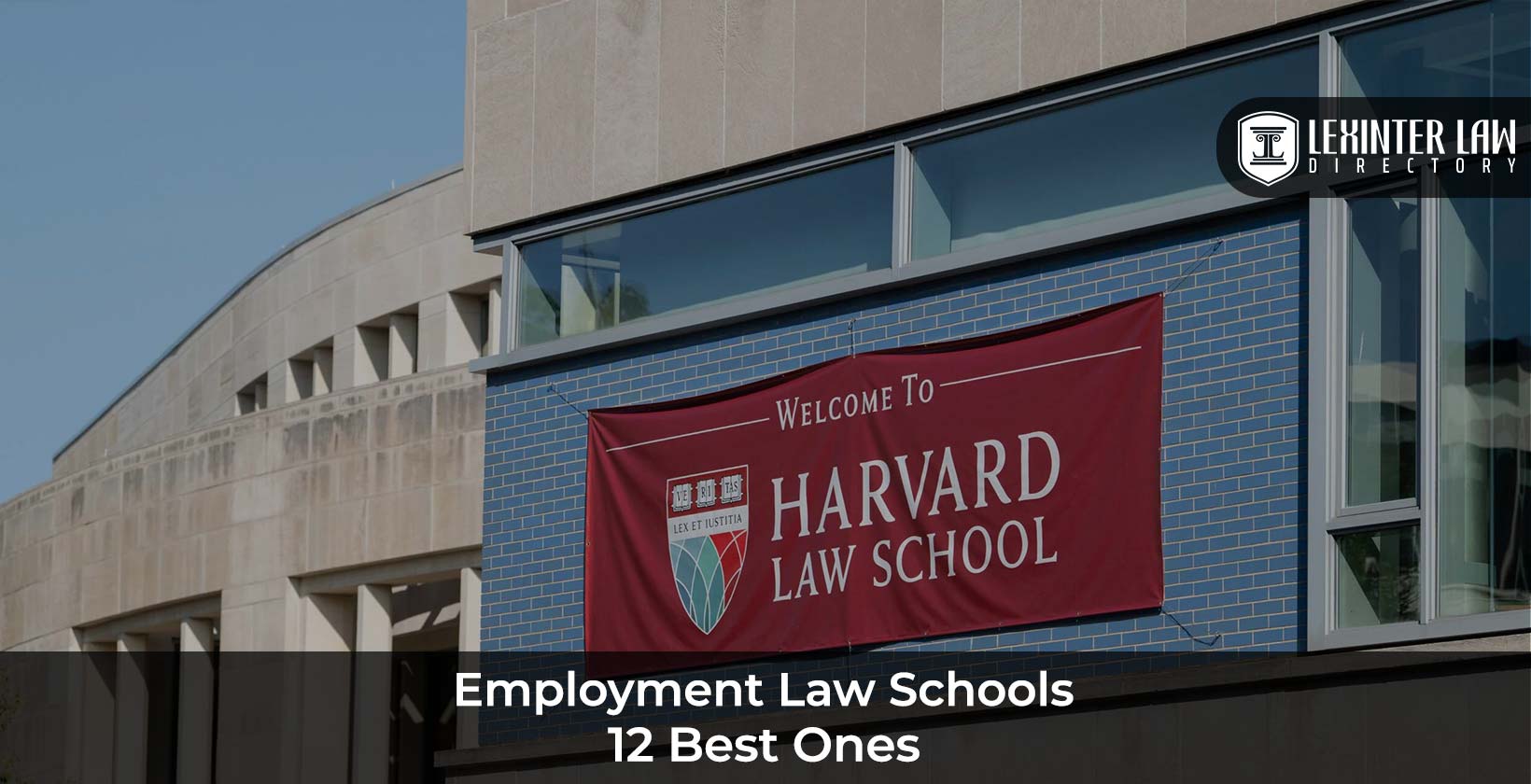12 Best Employment Law Schools
The best employment law schools provide a comprehensive curriculum focused on labor relations, workplace discrimination, and employee rights. The institutions are known for combining rigorous academic coursework with practical legal training through clinics, externships, and internships. Top schools such as Harvard, Columbia, and Stanford Law offer comprehensive programs that focus on key issues like discrimination, wrongful termination, and labor union law. The programs feature renowned faculty who are experts in employment law, helping students understand the theoretical and practical aspects of the field. The top employment law schools, moreover, provide significant networking opportunities through alumni associations and professional connections in the legal community.
Practical experience plays a vital role in the top law programs. Schools like Georgetown and Stanford Law emphasize hands-on learning, allowing students to gain real-world experience before entering the workforce. The universities, moreover, provide specialized fellowships and opportunities for students to gain experience in areas such as labor union representation and international employment law. Practical exposure, combined with a deep understanding of evolving employment law issues, makes graduates from top law schools highly sought after by law firms, corporations, and government agencies.
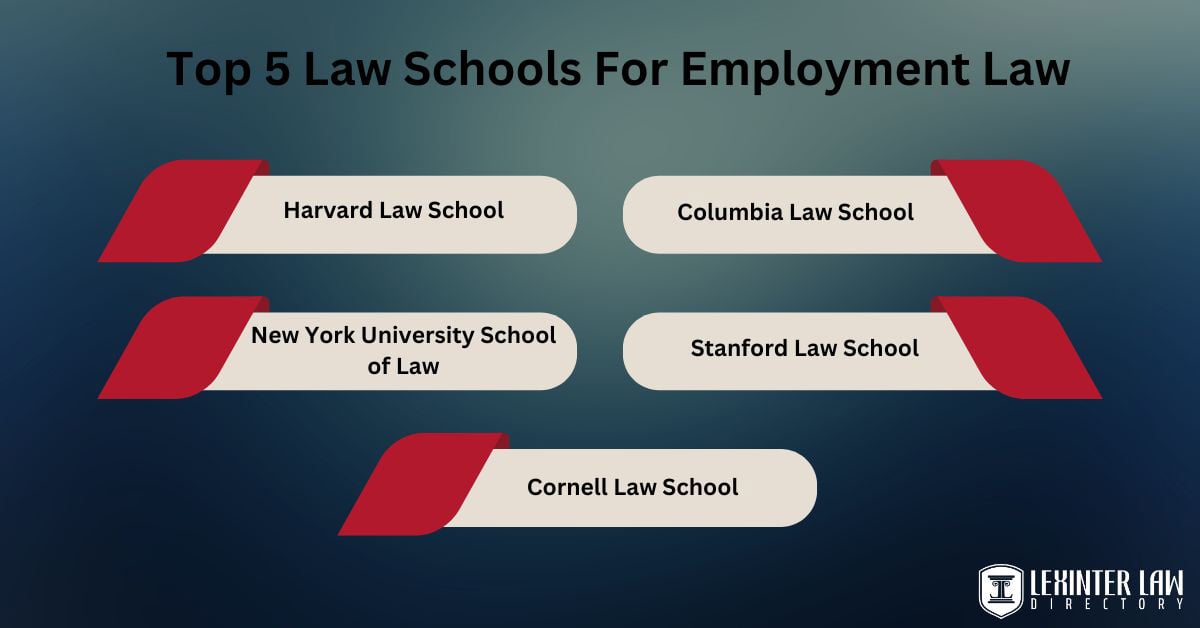
The top 5 law schools for employment law are listed below.
- Harvard Law School: Harvard Law School, established in 1817, is a renowned law school in the world. The law school offers a top-ranked program in employment law, focusing on labor relations and workplace issues. Harvard’s Employment Law Clinic provides students with hands-on experience in cases related to discrimination, wage disputes, and labor rights. The law school ranks 4th among the best law schools according to U.S. News and World Report. Notable alumni of Harvard law include Robert Reich, former U.S. Secretary of Labor, who has significantly contributed to labor policy in the U.S.
- Columbia Law School: Columbia Law School, founded in 1858, offers a specialized employment law curriculum within its broader legal education. The program emphasizes corporate and labor relations, helping students navigate the complexities of workplace law. Columbia’s focus on public and corporate law makes it a standout in employment law education. Alumni such as Lee C. Bollinger, president of Columbia University and a prominent advocate for workplace equality, showcase the school’s strength in shaping influential labor law professionals.
- New York University School of Law: New York University Law School, the oldest law school in New York, is renowned for its innovative achievement. NYU Law, ranked 9th among the best law schools, provides a comprehensive program in labor and employment law, integrating interdisciplinary approaches to social and economic impacts. The school’s Center for Labor and Employment Law fosters relationships among students, alumni, and industry professionals. NYU’s commitment to experiential learning and its strong alumni network make it a top choice for aspiring employment lawyers.
- Stanford Law School: Stanford Law School, founded in 1893, is known for its innovative approach to employment law education, combining theoretical and practical perspectives. The program emphasizes labor relations, workplace discrimination, and corporate employment policies, preparing students for diverse legal careers. Stanford consistently ranks among the top law schools globally for labor and employment law. Stanford Law is currently ranked 1st according to U.S. News and World Report 2024, as well as QS university ranking. Notable alumni include William Gould IV, former chairman of the National Labor Relations Board, a significant figure in labor law reforms.
- Cornell Law School: Cornell Law School is the law school of the famous Ivy League institution, Cornell University. The law school, established in 1887, offers a specialized program in international labor and employment law. Cornell’s employment law curriculum integrates global labor standards and workplace rights, making it unique among U.S. law schools. Cornell’s focus on international perspectives gives students a competitive edge in global employment law. The curriculum includes various courses, such as labor law and employment discrimination, that produce graduates who are well-versed in domestic and international labor law.
Table of Contents
- 1. Harvard Law School
- 2. Yale Law School
- 3. Stanford Law School
- 4. New York University School Of Law
- 5. University Of Chicago Law School
- 6. Columbia Law School
- 7. University Of Pennsylvania Law School
- 8. Duke University School Of Law
- 9. University Of Virginia School Of Law
- 10. Cornell Law School
- 11. University Of Michigan Law School
- 12. Northwestern University School Of Law
- How To Choose The Best Law School For Employment Law?
- What Is The Best Degree For Employment Law?
- How To Become An Employment Lawyer?
- How Long Would It Take To Study Employment Law?
- What Is The Average LSAT For Employment Law?
- What Can You Expect From A Career As An Employment Lawyer?
- What Is The Difference Between An Employment Lawyer And A Corporate Lawyer?
- How Do Employment Lawyers Earn?
- Where Do Most Employment Lawyers Work?
- How Can I Find Good Employment Lawyers Near Me With Lexinter?
1. Harvard Law School
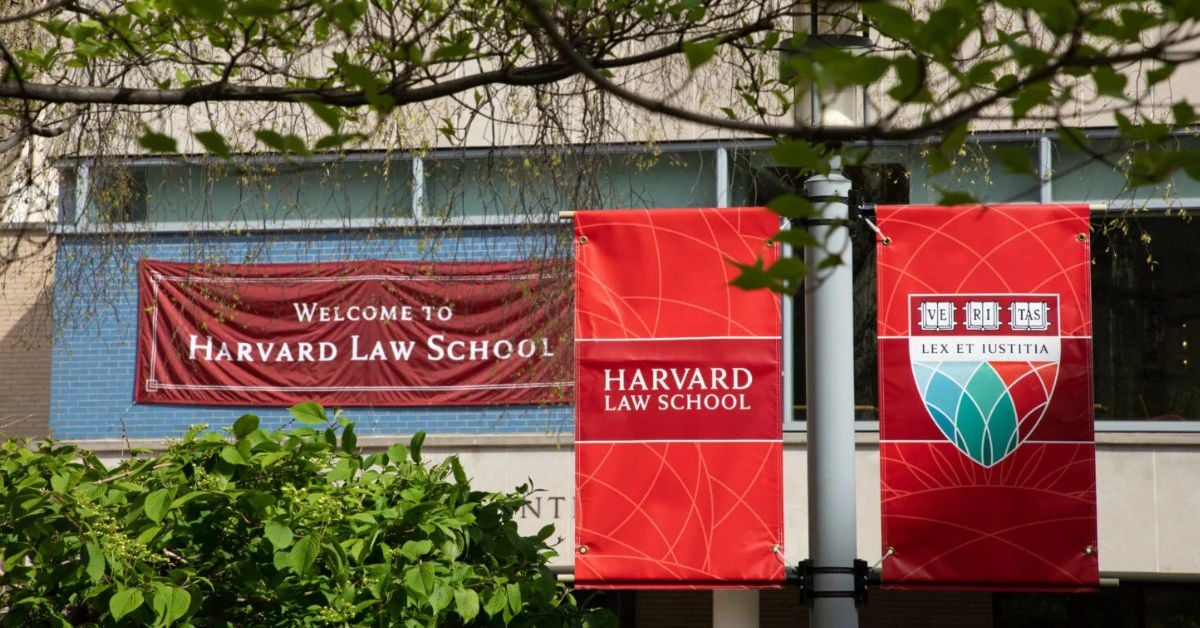
Harvard Law School (HLS) stands as one of the most prestigious institutions globally, shaping numerous leaders in law, politics, and various fields. The law school, part of Harvard University, is located in Cambridge, Massachusetts. Harvard Law, established in 1817, offers various programs, including the Juris Doctor (JD), Master of Laws (LLM), and Doctor of Juridical Science (SJD). The JD program remains the most sought-after, designed to provide students with a robust foundation in law while allowing flexibility in electives and clinical work. The LLM program attracts students globally for advanced legal training, while the SJD focuses on scholarly research for aspiring legal academics. Harvard Law School maintains a highly competitive admissions process, accepting approximately 9.6% of applicants. HLS received over 8,300 applications in a recent cycle and admitted just under 800 students. The median LSAT score for admitted students hovers around 174, while the median GPA is approximately 3.93, making Harvard one of the most selective law schools in the world. The cost of Harvard Law School is substantial, with the total cost of attendance (COA) for the 2024-2025 academic year estimated at $116,000. The total cost of attendance includes $78,692 for tuition, along with room and board, books, and personal expenses. Financial aid is available, with about 42.55% of students receiving various forms of scholarship or grant aid.
Harvard Law is ranked 4th (tie) out of 196 in the 2024 U.S. News & World Report’s Best Law Schools list. The school’s top rankings include 1st in Constitutional Law, 2nd in business/corporate law, 2nd in criminal law, and 3rd in dispute resolution. Harvard’s ranking as one of the Massachusetts best law schools is supported by its faculty expertise, clinical opportunities, and strong alumni network, which provides students with significant career advancement opportunities in the field. The specialized employment law program at Harvard offers students exposure to various aspects of the field, including anti-discrimination laws, wage and hour disputes, and union-related matters. Harvard’s curriculum equips students with the theoretical knowledge needed to succeed in the dynamic area of law. The program emphasizes the importance of understanding legal frameworks governing workplace safety, severance negotiations, and unemployment benefits, making students well-rounded practitioners. Harvard’s employment law faculty includes many esteemed scholars and practitioners in the field. Faculty members like Steve Churchill, who has decades of experience handling employment law cases, guide students through complex legal scenarios. Professor Churchill brings profound practical knowledge to the classroom and directs clinics that provide hands-on legal training for students aiming to pursue careers in employment law.
The Employment Law Clinic offers students real-world experience by allowing them to represent clients and work with government agencies, non-profits, and advocacy groups. Harvard’s clinic partnerships include placements with organizations such as the U.S. Equal Employment Opportunity Commission and the Massachusetts Commission Against Discrimination. Students tackle cases involving workplace discrimination, harassment, and wage issues, providing them with the skills to excel in employment law. Harvard Law School offers an extensive alumni network for employment law, which provides significant career advantages. The network supports students and graduates through mentoring, job placements, and professional connections. The HLS Amicus tool helps students and alumni stay connected, facilitating career advancement and expanding professional relationships in employment law and beyond. Notable alumni of Harvard Law include Robert Reich, former U.S. Secretary of Labor, who has significantly influenced labor policy in the United States. Wilma Liebman, former chair of the National Labor Relations Board, has played a pivotal role in shaping labor relations and workers’ rights policies.
Harvard Law School offers various employment law courses designed to cover diverse topics such as workplace discrimination, wage disputes, and employee rights. The foundational course, Employment Law, is complemented by advanced seminars and practical workshops that allow students to deepen their expertise. Students, in addition, explore related fields like labor law and social justice, which intersect with employment law. The employment outcomes for Harvard Law graduates are consistently strong. Graduates are highly sought after by top law firms, public interest organizations, and government entities. 95.3% of graduates secure employment within ten months of graduation, with many entering prestigious clerkships and big law firms. Harvard’s extensive career services ensure students receive personalized guidance and opportunities to thrive in their careers, particularly in employment law.
2. Yale Law School
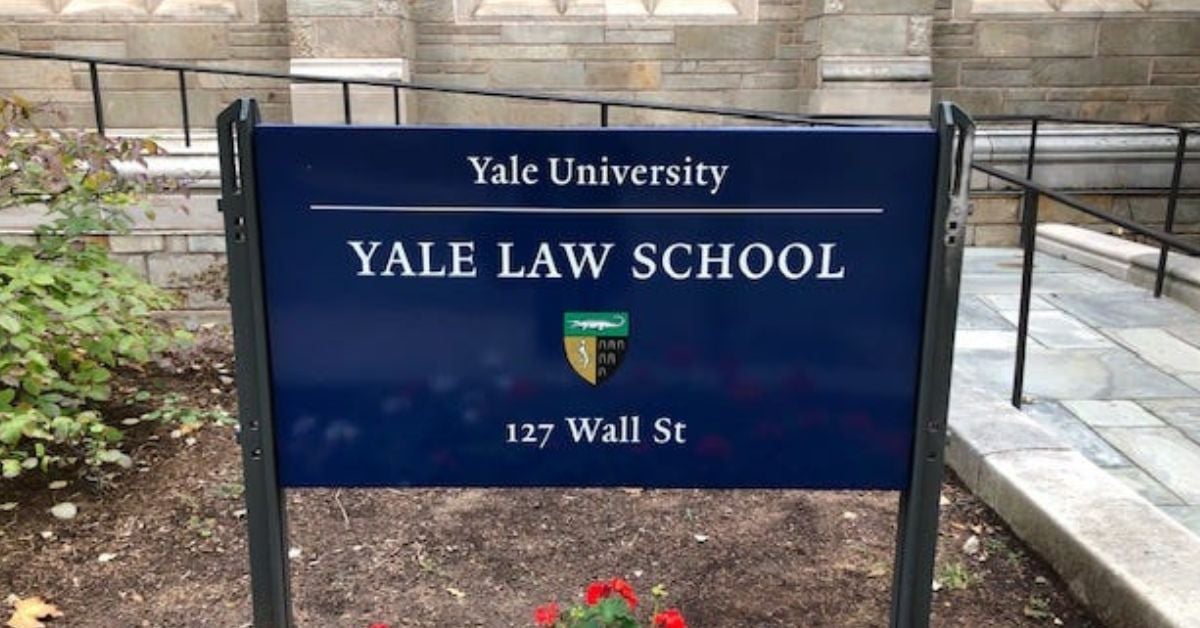
Yale Law School, founded in 1824 in New Haven, Connecticut, stands as one of the most prestigious law schools globally. The institution offers unparalleled resources, renowned faculty, and a comprehensive legal education that prepares students for various legal careers. Yale Law School offers several programs tailored to different career goals. The Juris Doctor (J.D.) is the flagship program, featuring nearly 200 courses each year. The Master of Laws (LL.M.) and Doctor of the Science of Law (J.S.D.) primarily accommodate students pursuing academic careers, with the J.S.D. requiring a substantial dissertation. The Master of Studies in Law (M.S.L.), in addition, provides non-lawyers with a foundational legal education. Yale’s emphasis on small class sizes, interdisciplinary learning, and individualized mentoring ensures that students receive a highly personalized educational experience. Yale Law School is highly selective, with an acceptance rate of just 5.58%. Admitted students boast a median LSAT score of 175 and a GPA of 3.96, reflecting the competitive nature of the school. The institution maintains a 3:1 student-to-faculty ratio, allowing for close faculty interaction and mentoring.
The cost of attending Yale Law School for the 2024-2025 academic year is $76,369 for tuition. Including living expenses, the total cost of attendance is estimated at $100,469. Yale Law School ranks 1st in Best Law Schools, tied with Stanford. Specialty rankings include 3rd in constitutional law, 2nd in international law, and 5th in clinical training. Yale Law School offers specialized programs in employment law that provide students with a comprehensive understanding of labor rights, workplace discrimination, and employment-related litigation. Courses such as labor law, workers’ rights, and employment discrimination are integral to the curriculum, equipping students with the skills to tackle complex employment law issues. The specialized programs emphasize theoretical frameworks and practical applications, allowing students to engage deeply with the evolving legal landscape of employment law. Yale Law’s faculty boasts several experts in employment law, offering students the chance to learn from seasoned practitioners and renowned scholars. Notable faculty members such as Professor Muneer Ahmad, who teaches in the Worker & Immigrant Rights Advocacy Clinic, focus on employment and labor law, advocating for vulnerable communities. The professors provide students with cutting-edge insights into labor policies, workers’ rights, and public interest law, enhancing students’ understanding of the field.
Yale Law School offers extensive clinical opportunities in employment law through its robust clinical programs. The Worker & Immigrant Rights Advocacy Clinic, for instance, provides students with hands-on experience in cases involving employment discrimination, wage theft, and workers’ rights. Students participate in externships with prominent organizations, such as labor unions and civil rights advocacy groups, gaining real-world experience in employment law. Yale Law boasts a vast and influential alumni network in employment law, offering significant networking opportunities for students and graduates. The school’s network, with more than 13,000 alumni worldwide, provides mentoring, career advice, and professional connections that help students navigate their employment law careers. Yale’s online platforms, such as Cross Campus, facilitate interactions between current students and alumni.
Yale Law offers various courses focusing on employment law, allowing students to gain a comprehensive understanding of labor rights, workplace discrimination, and various key issues. Courses such as Worker & Immigrant Rights Advocacy and Employment Discrimination Law provide theoretical and practical knowledge essential for employment law practice. Students engage deeply with complex topics, combining legal theory with practical skills, particularly through Yale’s extensive clinical programs. Yale Law School’s employment outcomes, including the field of employment law, are impressive, with nearly all graduates securing positions within ten months of graduation. Several graduates enter prestigious law firms, government agencies, and non-profit organizations specializing in employment law and labor rights.
3. Stanford Law School

Stanford Law School, founded in 1893, is one of the top law schools in the United States, known for its rigorous academic environment and prestigious reputation. The law school, founded in 1893 and located in Stanford, California, provides students with a well-rounded legal education. Stanford Law offers multiple law programs, including the Juris Doctor (JD) program, which focuses on mastering legal theory and practical skills. The Master of Laws (LLM) program offers specializations in areas like Corporate Governance and Environmental Law. The Stanford Program in International Legal Studies (SPILS) leads to a Master of the Science of Law (JSM) and emphasizes interdisciplinary research. The Doctor of the Science of Law (JSD), in addition, is an advanced degree for students pursuing academic careers, while the Master of Legal Studies (MLS) is available for non-lawyers seeking foundational legal knowledge. The acceptance rate at Stanford Law School for the 2024 academic year is 7.3%, making it one of the most selective law schools. Students admitted have an average LSAT score of 173 and an average GPA of 3.92. The highly competitive admissions process reflects Stanford’s commitment to academic excellence and selecting top-tier candidates for its programs. The cost of attending Stanford Law School for the 2024-2025 academic year is $74,475 for tuition alone. The total cost of attendance, including living expenses, is estimated at $116,814 (resident students) and $118,398 (non-resident students). Several students receive grants or scholarships, with 75-80% of students receiving various forms of financial aid.
Stanford Law School holds an impressive reputation, consistently ranking among the top law schools in the United States. Stanford Law, known for its innovative approaches to legal education, ranks 1st according to U.S. News and World Report 2024. The law school offers a specialized employment law program addressing rapidly growing workplace legal issues. The specialized program focuses on crucial topics like workplace privacy, wage and hour restrictions, and mandatory arbitration of disputes. The program equips students with practical and theoretical knowledge, allowing them to understand traditional and contemporary employment law issues. Stanford’s employment law curriculum focuses on evolving legal needs, emphasizing non-unionized workplace protections. Faculty expertise in employment law at Stanford Law is highly regarded, with professors like Alison D. Morantz leading the program. Professors bring extensive knowledge and experience, guiding students through complex legal scenarios in employment law. The faculty focuses on innovative and practical approaches, ensuring students are prepared for careers in litigation and policy development.
Stanford Law provides extensive clinical opportunities for students interested in employment law. The Policy Lab and various legal clinics allow students to engage in real-world legal work under expert supervision. The clinics focus on various legal areas, including labor and employment law, enabling students to gain hands-on experience while addressing significant legal issues faced by workers. Stanford Law School provides robust networking opportunities for students pursuing careers in employment law through its extensive alumni network. The Office of Alumni Relations actively connects students with graduates working in various sectors, including labor and employment law. Alumni frequently participate in mentoring programs, offer career advice, and help facilitate job placements. The network extends across major law firms, government agencies, and advocacy organizations, providing essential support for students seeking internships, clerkships, or post-graduation employment. Stanford Law offers various courses in employment law, including the highly regarded Employment Law class taught by Professor Alison Morantz. The course covers critical topics such as workplace privacy, wage disputes, and protections for non-unionized workers. Students are encouraged to engage with evolving employment law challenges, gaining theoretical knowledge and practical problem-solving skills. Employment outcomes for Stanford Law School graduates in employment law are consistently strong. Severe students secure positions at top law firms, government bodies, and public interest organizations specializing in labor and employment law.
4. New York University School Of Law
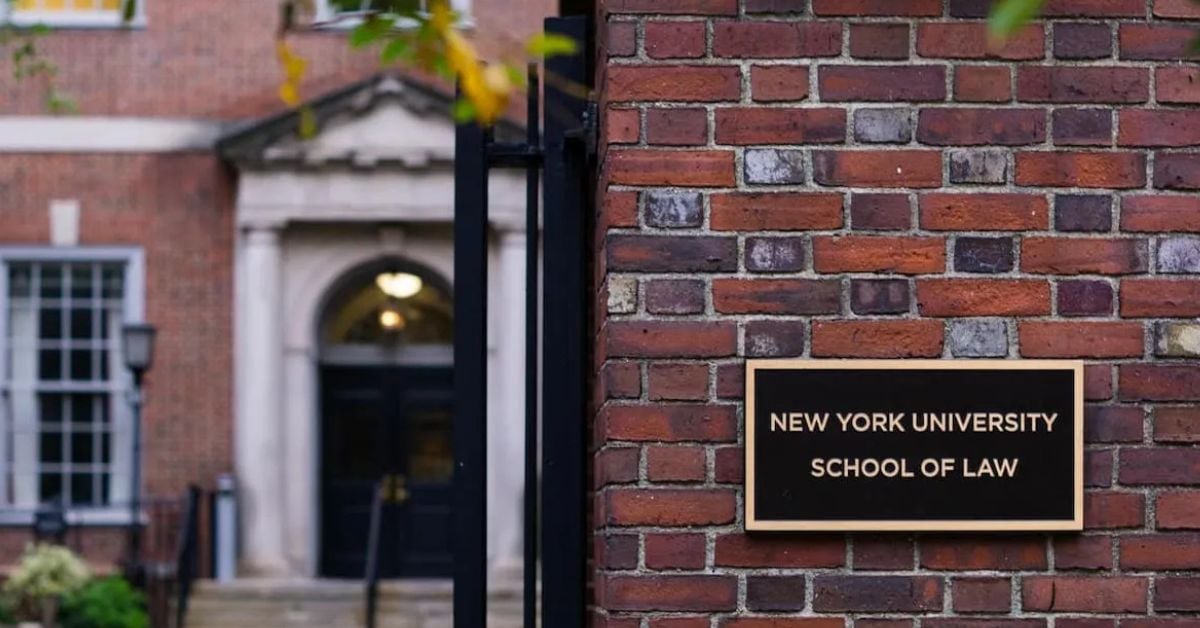
New York University School of Law, located in New York City, is one of the leading law schools in the country. The private research university, established in 1835, is renowned for its diverse academic offerings and strong emphasis on public interest law. The school’s strategic location in New York gives students access to countless legal resources and professional networks. NYU Law offers a variety of programs, including the Juris Doctor (JD), Master of Laws (LLM), and Doctor of Juridical Science (JSD). The JD program provides a comprehensive legal education with an emphasis on theory and practice. The LLM program offers specializations in fields such as tax law, corporate law, and international business regulation. The JSD is designed for lawyers pursuing academic careers in law. NYU, in addition, offers joint degrees with various schools, such as the MBA/JD and MA/JD, providing interdisciplinary learning opportunities. New York University School of Law has an acceptance rate of 16.8%, making it one of the more competitive law schools. Applicants generally present a median LSAT score of 172 and a GPA of 3.90, reflecting the school’s rigorous selection process. Tuition at NYU Law is set at $80,014 for the academic year of 2024. Factoring in living expenses, books, and personal costs, the total cost of attendance is estimated at approximately $109,458 annually.
NYU Law is highly regarded and ranked 9th among the best law schools, according to U.S. News and World Report 2024. The law school, in addition, ranks 1st in criminal law, 1st in tax law, and 2nd in clinical training. NYU Law offers specialized programs in employment law, covering key areas like labor rights, workplace discrimination, and wage disputes. The programs are part of the broader curriculum that emphasizes theoretical and practical knowledge in employment law. Students engage in courses tailored to employment law issues, preparing them for careers in corporate and public interest sectors. NYU Law has renowned faculty members who specialize in employment law and various related fields. One example is Cynthia Estlund, an expert in labor law, employment discrimination, and workplace governance. Cynthia’s work focuses on the evolving role of labor law in ensuring fair employment practices. Another notable faculty member is Samuel Estreicher, who directs the Center for Labor and Employment Law and has authored influential works on employment law, workplace privacy, and alternative dispute resolution.
NYU Law offers several clinics focusing on employment and labor rights. The Immigrant Rights Clinic, for example, provides students the opportunity to handle cases related to wage theft and employment discrimination affecting immigrant workers. Another key clinic is the Civil Rights Clinic, which addresses systemic employment discrimination and advocates for workers’ rights in collaboration with non-profits and government agencies. New York University School of Law has a strong alumni network, especially in the field of employment law. The Center for Labor and Employment Law facilitates connections between students, alumni, and professionals, offering events and networking opportunities that help students enter the competitive field. NYU Law offers a comprehensive range of employment law courses, including employment law, labor law, employment discrimination, and employee benefits law. The courses provide students with theoretical knowledge and practical skills to tackle complex workplace issues such as discrimination, collective bargaining, and benefits management. Specialized seminars, like Labor and Employment in the Entertainment Industry, offer students opportunities to study industry-specific applications of employment law. Employment outcomes for NYU Law graduates in employment law are strong, with over 97% of graduates securing employment within ten months of graduation. Several graduates pursue careers at top law firms, public interest organizations, and government agencies.
5. University Of Chicago Law School
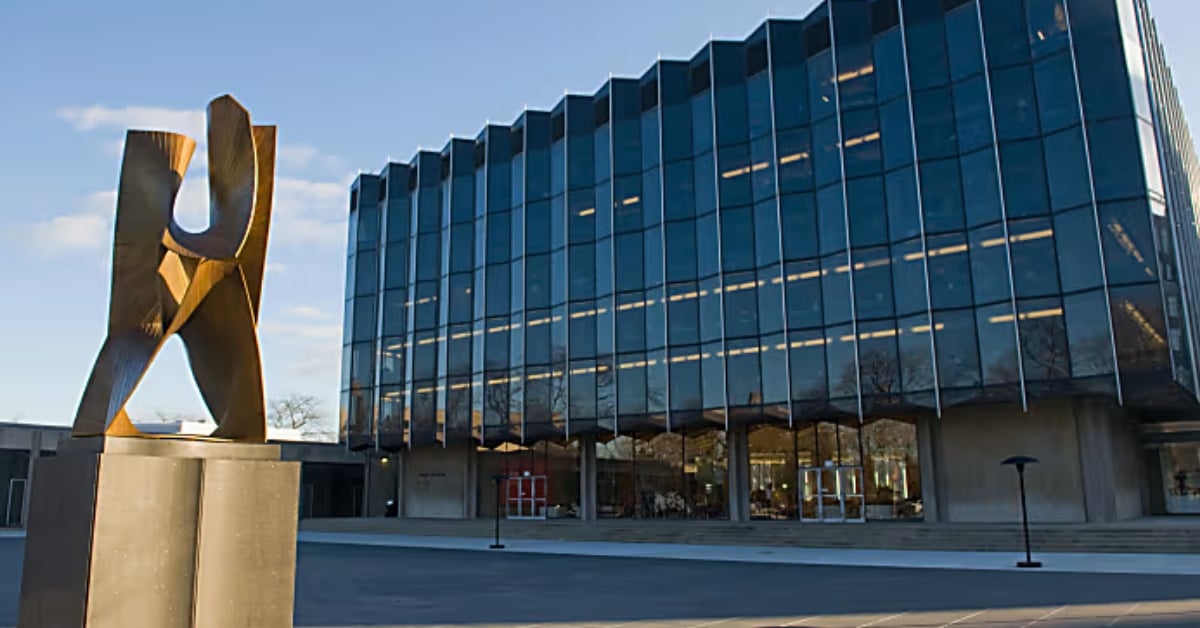
The University of Chicago Law School, founded in 1902, is renowned for its rigorous academic programs and innovative approach to legal education. The private research institution, located in Chicago, Illinois, prepares students for careers in various sectors of law. Chicago Law School offers a variety of programs, including a JD program and an LLM program. The JD program, which is the main offering, allows students to engage in a variety of specialized courses, including constitutional law, corporate law, and criminal law. The LLM program is a specialized degree, consisting of a rigorous and elite academic program. Chicago Law School offers a robust joint-degree program in law and business, known for its integration of legal and business education. The program, designed in collaboration with Chicago Booth, allows students to earn a Juris Doctor (JD) and Master of Business Administration (MBA), preparing them to excel in the complex intersection of law and business. The school offers two tracks: a three-year accelerated JD/MBA and a traditional four-year JD/MBA program, providing flexibility based on students’ professional goals. The acceptance rate at Chicago Law stands at a competitive 12.78%, with students presenting an average LSAT score of 173 and a GPA of 3.94. The tuition for UChicago Law School is set at $79,539, with additional living and personal expenses bringing the total cost of attendance to approximately $116,286. 30% of LLM students, however, receive merit-based grants or scholarships.
UChicago Law School was ranked No. 3 by U.S. News & World Report in 2024. The law school’s reputation for producing top-tier legal professionals is strengthened by its focus on theoretical legal studies and practical application. The law school’s specialty rankings include 2nd in constitutional law, 2nd in commercial law, and 4th in business law. The law school offers specialized programs in employment law, allowing students to engage deeply with topics like labor rights, workplace discrimination, and employee benefits. Courses cover a variety of employment law-related issues, ensuring that students gain a comprehensive understanding of the regulatory and legal frameworks governing the workplace. The school’s curriculum emphasizes the intersection of law and economics, further enhancing its employment law offerings. Faculty expertise in employment law at the University of Chicago is another key strength. Professors like David A. Strauss are highly regarded for their work in constitutional and employment law. Strauss, known for his extensive scholarship, brings valuable insights to students interested in employment law and civil rights.
Students at the law school gain practical experience through the Employment Law Clinic, which operates under the Edwin F. Mandel Legal Aid Clinic. The clinic allows students to work on real employment law cases, advocating for workers facing wage theft, discrimination, or wrongful termination. The Kirkland & Ellis Corporate Lab Clinic offers opportunities for students to work on corporate governance and employment issues, preparing them for careers in public and private sectors. Chicago Law, one of Illinois best law schools, has a strong alumni network, which is particularly beneficial for students specializing in employment law. Students connect with professionals through the Affinity Mentoring Programs, which pair first-year law students with alumni mentors. The networks help facilitate job placements and career advancement in the public and private sectors. The school’s graduates find roles at prestigious law firms, government agencies, and corporate legal departments, making the alumni network an invaluable resource for professional growth.
Chicago Law School offers various employment law courses, covering topics such as labor law, workplace discrimination, and employee benefits. The courses equip students with the theoretical knowledge and practical skills necessary to navigate complex employment law issues. Interdisciplinary courses, such as law and economics, provide students with broader perspectives on the economic implications of labor regulations. Graduates from the University of Chicago Law School boast a high first-time Bar exam pass rate of 97.1%, reflecting the strength of the academic preparation provided. Employment outcomes for University of Chicago Law School graduates are consistently strong, with 97.7% securing full-time positions within ten months of graduation. 59.6% of the school’s graduates, including employment graduates, joined national law firms in 2023.
6. Columbia Law School
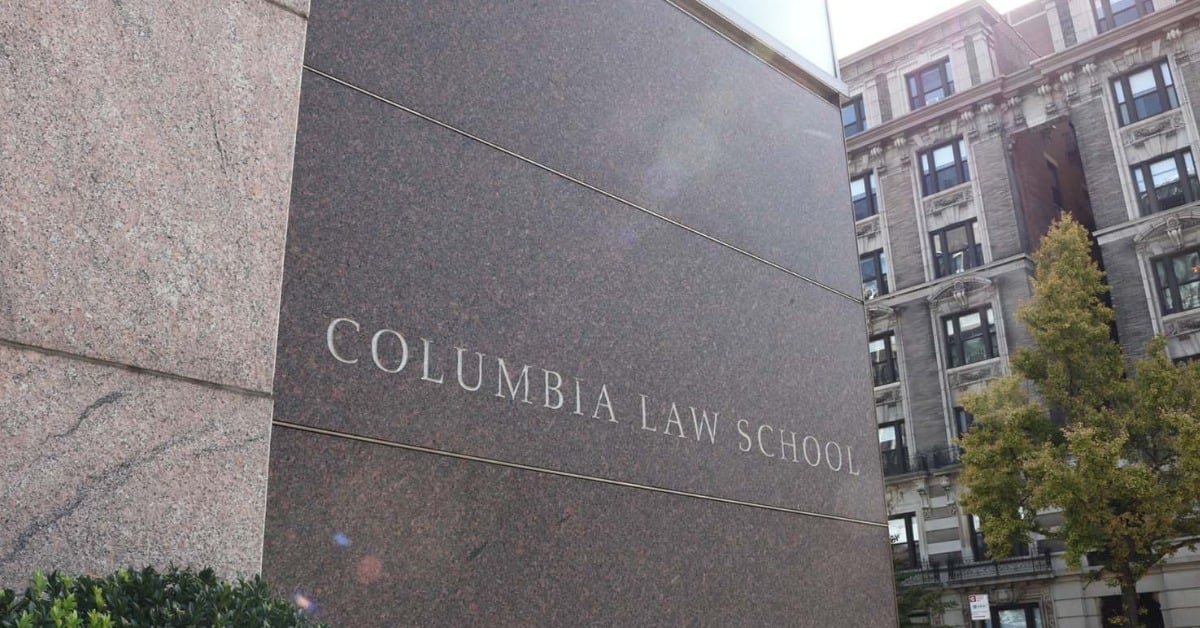
Columbia Law School is a prestigious institution renowned for its rigorous legal education and interdisciplinary opportunities. Columbia Law, established in 1858 and located in New York City, has built a strong reputation for producing top legal professionals in multiple fields. The school offers several programs, including its flagship Juris Doctor (JD) and the Master of Laws (LLM), which are highly regarded worldwide. The JD program provides foundational legal education combined with specialized courses in areas like business law, employment law, and public interest law. The LLM program focuses on specific areas of law for international students or legal professionals seeking to deepen their expertise. The school, in addition, offers joint degree programs with various Columbia schools, including the JD/MBA. The acceptance rate for Columbia Law is highly competitive, with only 12.2% of applicants gaining admission in 2023. Admitted students present impressive credentials, with a median LSAT score of 173 and a GPA of 3.9.
Tuition at Columbia Law School for the 2024-2025 academic year is $81,888, marking a 3.85% increase from the previous year. Total costs, including living expenses, reach approximately $119,997 annually. Columbia Law School ranks 8th among the top law schools globally, recognized for its academic excellence and robust legal education. The law school, in addition, is ranked 1st in contracts law, 2nd in business law, and 6th in tax law. Columbia Law, moreover, ranked No. 4 in the Times Higher Education 2024, maintains a strong reputation for preparing students for careers in public and private sectors. Columbia Law provides specialized programs in employment law, with courses covering labor law, employment discrimination, and employee benefits. The courses allow students to thoroughly understand legal issues surrounding workers’ rights and employer responsibilities. The curriculum integrates interdisciplinary studies, offering students an enriched perspective on how employment law intersects with areas like economics and public policy.
Faculty expertise in employment law at Columbia is exemplified by professors such as Mark Barenberg, a leading authority on labor law and workers’ rights, and Kate Andrias, who focuses on the role of law in structuring power relations in workplaces. The faculty members bring a wealth of practical experience and academic insight, making them invaluable resources for students interested in employment law. Columbia offers clinical opportunities in employment law through its Law, Power, and Justice Clinic, which focuses on issues like workplace rights and discrimination. Students, in addition, participate in the Community Advocacy Lab, where they gain hands-on experience representing low-wage workers in employment disputes. The clinics provide students with invaluable practical training, ensuring they are well-prepared for careers in employment law.
Columbia Law School provides an exceptional network for employment law professionals, with over 27,000 alumni spread across 119 countries. The extensive alumni network is an invaluable resource for students seeking career advice, mentorship, or job opportunities in employment law. Alumni working in top law firms, government agencies, and public interest organizations regularly engage with current students through networking events, mentorship programs, and career panels. Columbia Law’s course offerings in employment law are comprehensive, covering key subjects such as labor law, employment discrimination, and workplace privacy. Notable courses include Employment Law, which examines legal regulations governing employer-employee relationships in the U.S., and Law of the Workplace, which explores contemporary issues like the gig economy and global labor rights. The courses provide students with a strong foundation to address real-world challenges in employment law and workplace regulation. Employment outcomes for Columbia Law graduates specializing in employment law are outstanding, with many securing positions in top-tier law firms, corporate legal departments, and government entities. Columbia’s career services play a vital role in helping students navigate the job market, offering resources such as resume workshops, mock interviews, and networking events.
7. University Of Pennsylvania Law School
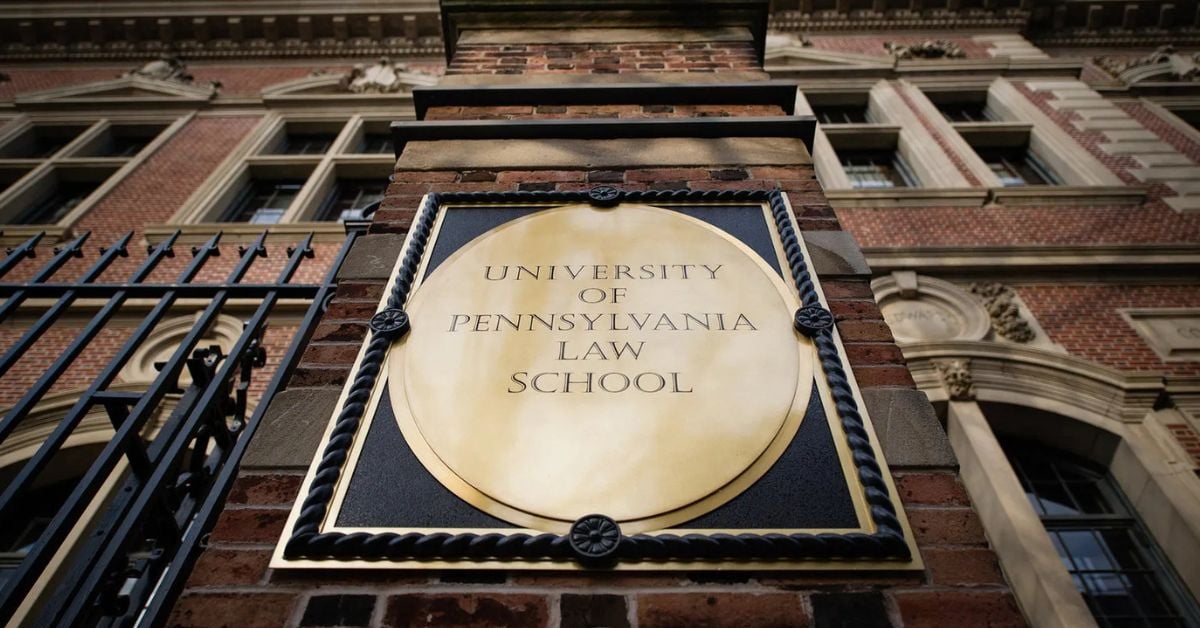
The University of Pennsylvania Law School is a prestigious Ivy League institution known for its academic rigor and interdisciplinary approach. Penn Care Law, located in Philadelphia, offers a comprehensive legal education that combines theory with practical experience. The JD program at Penn Law emphasizes a robust legal foundation while allowing students to specialize in areas such as employment law, corporate law, and international law. The school, in addition, offers an LLM program for international students, providing the opportunity to gain advanced legal knowledge. Joint degree programs, such as the JD/MBA with the Wharton School of Business, enable students to pursue interdisciplinary studies that align with their career goals. The acceptance rate at the University of Pennsylvania Law School is 9.88%, making it highly competitive. The median LSAT score for admitted students is 172, with a median GPA of 3.92. Tuition at Penn Law is set at $76,934 for the academic year of 2024. Living expenses cost another $24,788, bringing the total cost of attendance to approximately $101,722 annually.
Pennsylvania Law School is ranked 4th among the top law schools in the U.S. 2024, known for academic rigor and an interdisciplinary approach. The law school’s notable rankings include 4th in business law, 5th in contracts law, and 7th in criminal law. Penn Law offers specialized programs in employment law, covering essential topics like labor law, workplace discrimination, and employee benefits. Students develop a comprehensive understanding of legal regulations governing employer-employee relationships, preparing them for diverse roles in the field. The interdisciplinary approach allows students to explore the intersection of law and public policy, which is essential for understanding employment law within broader societal contexts. The faculty at Penn Law is well-regarded for its expertise in employment law. Catherine Struve, an expert in procedural and labor law, brings practical and scholarly insights to the classroom. Regina Austin is another key figure whose work focuses on the intersection of employment law and social justice. Students interested in practical experience participate in the Employment Advocacy Project, where they represent low-wage workers in employment disputes. The Civil Practice Clinic, in addition, offers students the chance to work on real employment law cases, such as workplace discrimination and wage theft, providing invaluable hands-on experience.
The University of Pennsylvania Carey Law School has a robust alumni network, particularly valuable for students pursuing careers in employment law. The school’s alumni are well-connected in various industries, including top law firms, corporations, and government agencies. Students gain access to mentoring, networking events, and career advice through Penn Law’s alumni programs. The MyPenn Alumni Network, an extensive resource, allows students and alumni to stay connected and explore career possibilities globally. Employment law courses at Penn Law cover various topics, providing a comprehensive education in the field. Key courses include employment discrimination, employee benefits law, and labor law, which give students an understanding of employer and employee rights and obligations. The courses are supplemented by clinics and externships that allow students to gain hands-on experience, ensuring they are well-prepared to tackle real-world challenges in employment law. Penn Law graduates specializing in employment law enjoy excellent employment outcomes. 98.5% of graduates, including employment law graduates, secured full-time employment within ten months of graduation. The school’s reputation and strong career services, including its Office of Career Strategy, provide invaluable support in job placement.
8. Duke University School Of Law
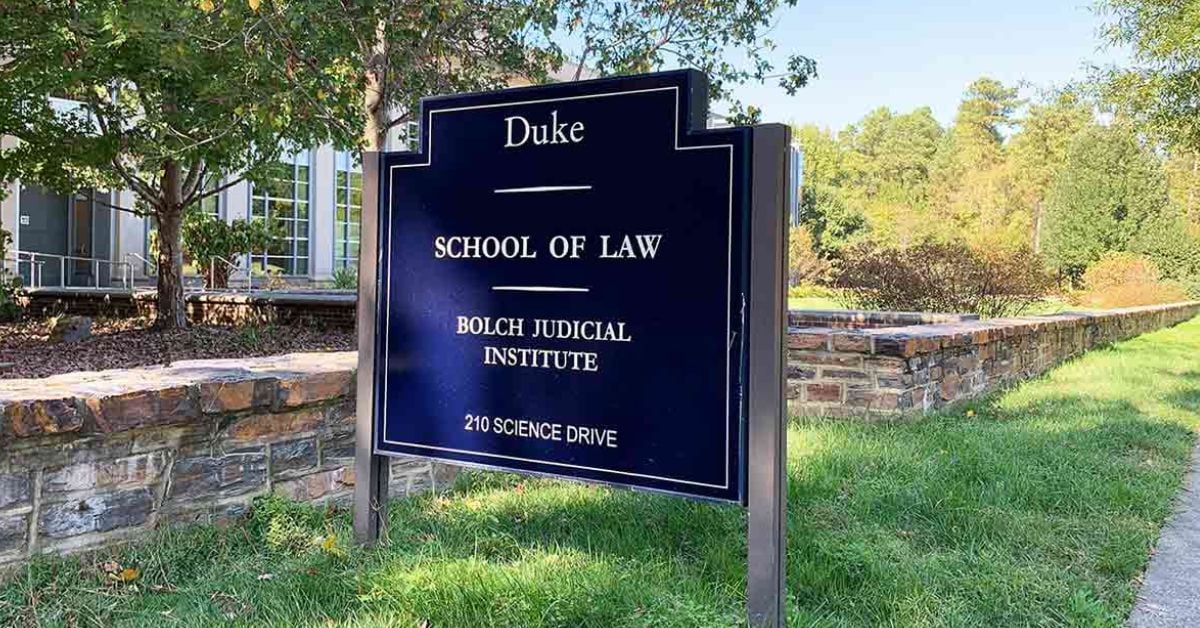
Duke University School of Law is a highly prestigious law school established in Durham, North Carolina. The law school is known for its academic rigor and interdisciplinary approach to legal education. Duke Law offers various programs, including the Juris Doctor (JD), Master of Laws (LLM), and various joint degrees, such as the JD/MBA and JD/LLM. The JD program at Duke Law is rigorous, focusing on foundational courses like civil procedure, contracts, and constitutional law during the first year. Students specialize in areas like employment law, corporate law, or international law in subsequent years, choosing from various elective courses. The school, in addition, offers clinics and externships that provide practical experience, allowing students to apply their academic knowledge to real-world legal issues. The acceptance rate at Duke Law for the 2023-2024 academic year stands at 10.5%, making it highly competitive. The school’s LSAT requirement lies between 168 and 172 (25th – 75th percentile), and the GPA requirement is between 3.78 and 3.96 (25th – 75th percentile). The high standards ensure that the student body is composed of individuals with strong academic backgrounds and professional potential.
Tuition at Duke Law is $77,100 for the academic year of 2024-25, with additional costs such as room and board, books, and various fees bringing the total cost of attendance to approximately $109,398 annually. 94.96% of students, however, receive grants or scholarships, making the education more accessible for many students. Duke Law holds a strong reputation for its academic excellence and is consistently ranked among the top law schools in the United States. The law school ranks No. 4 among the best law schools in the U.S. News and World Report 2024. The school’s notable rankings include 7th in criminal law, 10th in constitutional law, and 10th in tax law. Duke Law School offers specialized programs in employment law, covering essential areas such as labor law, workplace discrimination, and employee benefits. Students have the opportunity to dive deep into regulatory frameworks governing workplace relations, preparing them for careers in public and private sectors. The employment law curriculum is complemented by electives and interdisciplinary courses that allow students to explore connections between employment law and various legal domains. Duke Law boasts notable faculty expertise in employment law. Professor Guy-Uriel Charles, for example, specializes in employment discrimination and civil rights, offering valuable insights into the complexities of workplace legal issues. Another key faculty member, Professor Kimberly Krawiec, focuses on labor law and the regulatory environment surrounding employee relations.
Duke Law offers clinical opportunities for students interested in employment law through its Civil Justice Clinic and Community Enterprise Clinic. The Civil Justice Clinic allows students to work on cases related to housing, employment, and benefits, partnering with organizations like Legal Aid of North Carolina. The Community Enterprise Clinic gives students the chance to assist nonprofits and social entrepreneurs on community development projects involving employment law issues, ensuring practical experience that enhances their academic knowledge. Duke Law provides extensive networking opportunities through its strong alumni network. The Law Alumni Association (LAA) connects students with over 14,000 alumni worldwide, providing valuable mentorship and career support. Duke’s alumni frequently engage with students through events, mentoring programs, and career panels. Duke Law offers specialized courses in employment law, covering critical areas such as labor law, workplace discrimination, and employee rights. Students choose from electives that focus on the evolving landscape of employment regulations and workplace protections. The interdisciplinary approach ensures that students gain a broad perspective on how employment law intersects with areas like corporate governance and public policy. Employment outcomes for Duke Law graduates, particularly in employment law, are consistently strong. The law school boasts a 99.1% employment rate within nine months of graduation, with many students securing positions in top-tier law firms, public interest organizations, or as in-house counsel.
9. University Of Virginia School Of Law

The University of Virginia School of Law, established in 1819, is one of the most prestigious law schools in the U.S., known for its academic excellence and emphasis on a balanced education. UVA Law, located in Charlottesville, Virginia, remains highly regarded for its interdisciplinary approach to legal education. The school offers a variety of programs, including the Juris Doctor (JD), Master of Laws (LLM), and Doctor of Juridical Science (SJD), serving students from diverse legal backgrounds. UVA Law’s JD program is the core of its academic offerings, structured to provide a strong foundation in all areas of law. Students focus on essential legal subjects such as constitutional law, contracts, and criminal law in the first year. Second and third-year students tailor their education by choosing from various electives, clinics, and externships, including students in employment law. Joint degrees, such as the JD/MBA, allow students to integrate law with business studies. UVA Law is highly selective, with an acceptance rate of 11.46%, admitting only the top candidates from a large pool of applicants. The school’s LSAT requirement lies between 167 and 172 (25th – 75th percentile), and the median GPA is 3.94, reflecting the academic rigor of the admissions process. Tuition at UVA Law is $74,700 for Virginia residents and $77,700 for non-residents for the academic year of 2024. The total cost of attendance, including living expenses, is approximately $105,870 annually.
UVA Law ranks 4th in the best law schools according to U.S. News and World Report 2024. The school is further recognized for tax law (ranks 5th), criminal law (ranks 7th), and business law (ranks 8th). UVA Law is well-known for its excellent academic environment, high employment rates, and strong connections with prestigious law firms, government agencies, and clerkships. The school’s reputation is further bolstered by its student satisfaction, ranking 1st for Best Classroom Experience and Best Professors in Princeton Review’s rankings. UVA Law offers specialized programs in employment law, providing comprehensive coverage of workplace rights, labor regulations, and employment discrimination. The interdisciplinary nature of the program prepares students for diverse roles, whether in corporate law, public interest, or government regulation. The faculty at UVA Law includes experts like Professor Kimberly Krawiec, a leading scholar in labor and employment law, and Professor Rachel Harmon, who focuses on civil rights and workplace discrimination. The faculty members bring a wealth of practical and academic experience, allowing students to gain insights into the theoretical and real-world applications of employment law.
Students interested in practical experience have access to UVA’s Employment Law Clinic, where they work on real cases involving wage theft and wrongful termination. The Civil Rights Clinic, in addition, offers employment law opportunities, allowing students to advocate for workers facing discrimination and unfair labor practices. The University of Virginia School of Law provides extensive networking opportunities for students pursuing careers in employment law. Alumni engage with students through events, mentorship programs, and career panels, which are instrumental in guiding future employment lawyers toward internships, clerkships, and job placements. The law school offers comprehensive course offerings in employment law, covering critical topics such as labor law, employee benefits, and employment discrimination. Courses like Labor Law and Employment Discrimination provide a robust foundation in the regulations governing the workplace. Students, moreover, take interdisciplinary courses that explore how employment law intersects with areas like public policy and economics, ensuring a well-rounded understanding of the field. Employment outcomes for graduates specializing in employment law at UVA Law are exceptionally strong, with a near 100% employment rate within ten months of graduation. Several graduates secure positions in top law firms, public interest organizations, and government entities. UVA’s Career Services Office plays a pivotal role in connecting students with job opportunities.
10. Cornell Law School

Cornell law school is the law school of the renowned Cornell University, established in 1887. The prestigious Ivy League institution, located in Ithaca, New York, is known for its prestigious academic programs and rigorous legal education. Cornell Law offers various degrees, including the Juris Doctor (JD), Master of Laws (LLM), and the Doctor of the Science of Law (JSD). The school offers a high-rated JD program, ensuring a close-knit community. The LLM program offers more than 200 courses and seminars, including fundamental courses. Cornell Law, moreover, offers an online master’s degree in legal studies, especially for business professionals, known as the M.S.L.S. program. Cornell Law is highly competitive, with an acceptance rate of 19.3%, meaning only a select number of applicants are admitted each year. The average LSAT score of admitted students is 172, and the median GPA stands at 3.90. The statistics highlight the academic excellence required to gain admission to the top-tier law school.
Tuition at Cornell Law School stands at $81,306 for the academic year of 2024-25. The law school, in addition, costs $110 as a student activity fee, $12,296 for housing, and $2,650 for books and supplies. The total estimated cost, including tuition and personal expenses, is approximately $109,636. Cornell Law School holds a strong reputation as a top-tier law school, consistently ranked among the best in the nation. Cornell Law, ranked 14th by U.S. News & World Report in 2024, is well-respected for its rigorous academic programs and strong focus on interdisciplinary studies. The law school, moreover, ranks 11th in constitutional law, 11th in contracts law, and 20th in criminal law. The law school offers specialized programs in employment law, with students able to engage in relevant coursework such as labor law, employment discrimination, and employee benefits. Cornell’s partnership with its School of Industrial and Labor Relations provides a comprehensive approach to employment law, blending legal principles with labor relations and human resources perspectives. The interdisciplinary structure ensures students are well-prepared for various legal challenges in the field of employment law.
Notable faculty members at Cornell Law specializing in employment law include Angela Cornell, who directs the Labor Law Clinic and focuses on workers’ rights and labor justice. Angella’s expertise in collective labor rights and her international work provide students with a broad and deep understanding of employment law. Beth Lyon, a clinical law professor, is involved in experiential learning and advocacy in employment law, focusing on real-world labor issues and immigrant rights. Cornell offers practical opportunities for students through its Labor Law Clinic, which allows students to represent clients in employment-related cases such as unfair labor practices and collective bargaining disputes. Another key experiential opportunity is the Low-Income Taxpayer Law and Accounting Practicum, where students handle employment law issues related to worker benefits and taxation.
Cornell Law School is well-regarded for its extensive network and strong alumni base, which plays a vital role in supporting students pursuing employment law. The Cornell Law Alumni Association actively connects current students with alumni in top law firms, corporate legal departments, and government agencies. Cornell offers various employment law courses tailored to equip students with a comprehensive understanding of the field. Courses like Labor Law, Employment Discrimination, and Employee Benefits provide students with the legal frameworks necessary to navigate complex workplace regulations. The school encourages interdisciplinary learning, allowing students to explore the intersection of employment law with corporate governance and public policy. Graduates from Cornell Law specializing in employment law enjoy excellent employment outcomes. 95% of graduates secure full-time employment within nine months of graduation, with many joining top law firms or working in government agencies.
11. University Of Michigan Law School
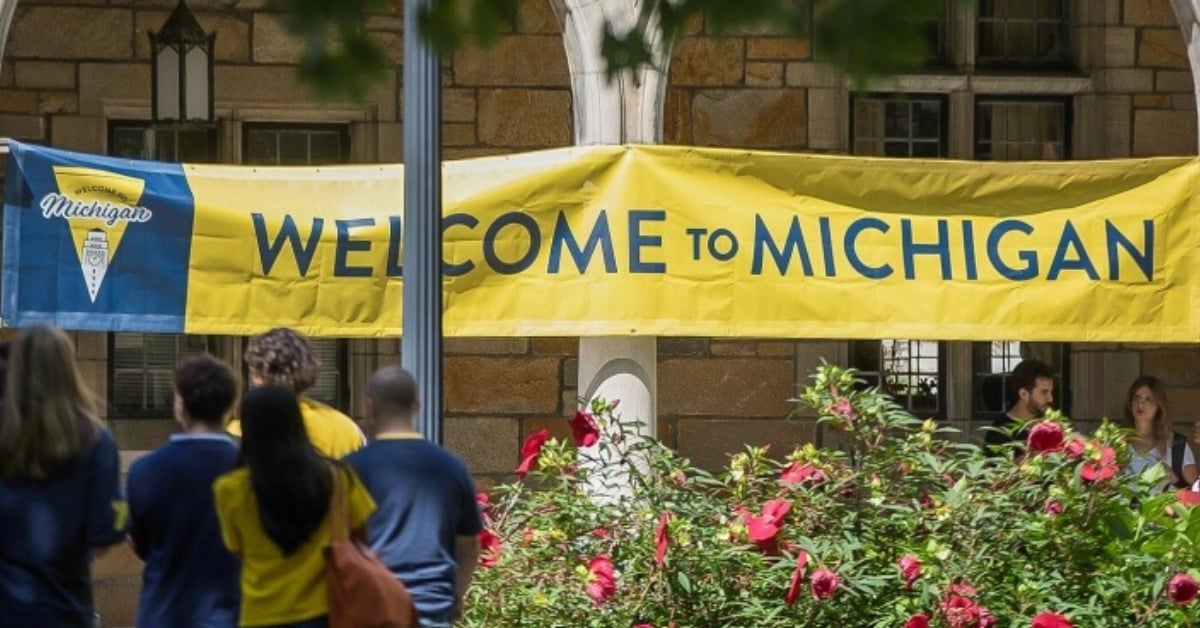
The University of Michigan Law School, founded in 1859, is a public law school located in Ann Arbor, Michigan. The University of Michigan Law School offers a highly regarded Juris Doctor (JD) program alongside specialized programs like the Master of Laws (LLM) and the Doctor of Juridical Science (SJD). The JD program is the flagship program, requiring 83 credit hours to be completed by students. Students must complete fundamental and elective courses to earn a JD degree. The LLM program is an advanced degree for lawyers interested in specializing in any legal field. The law school offers several dual-degree programs in fields incorporating business, public policy, and law. Admission to the University of Michigan Law School is highly selective, with an acceptance rate of 12.58%. The school’s LSAT requirement lies between 165 and 172 (25th – 75th percentile). The law school, moreover, requires an undergraduate GPA between 3.64 and 3.92 (25th – 75th percentile).
The cost of attending the University of Michigan Law School is substantial. Tuition is $69,584 per year for resident students, while out-of-state students pay $72,584. The total cost of attendance, including living expenses, books, and personal costs, is approximately $96,728 per year. The University of Michigan Law School holds a strong reputation, consistently ranking among the top law schools in the U.S. The school is currently ranked No. 9 in Best Law Schools by U.S. News & World Report, reflecting its academic excellence, faculty expertise, and strong student outcomes. The University of Michigan Law School, one of Michigan best law schools, offers a specialized program in employment law that provides theoretical and practical training. Core courses include employment law, wrongful discharge laws, and discrimination based on race. Michigan Law School boasts faculty experts in employment law, such as Professor Samuel Bagenstos, a nationally recognized figure in disability rights and employment law, and Professor Kate Andrias, who focuses on labor law and worker rights. Another prominent faculty member, Professor Richard Primus, contributes to constitutional and employment law discussions, making the school a hub for labor and employment law scholarship. Clinical opportunities at Michigan Law for students interested in employment law are extensive. The Workers’ Rights Clinic provides hands-on experience in representing clients facing unemployment benefits disputes under the Michigan Employment Security Act. Students get the chance to draft appellate briefs, engage in oral arguments, and help shape state unemployment policies.
Networking and alumni connections in employment law are strong at Michigan Law. Notable alumni include Jonathan Alger, president of James Madison University and an expert in labor and employment issues within higher education. Another distinguished alumnus, Raymond McGuire, a senior executive at Citigroup, has been involved in numerous employment-related corporate policies. The University of Michigan Law School offers a comprehensive set of courses focused on employment law. Core offerings include Employment Discrimination, which covers Title VII of the Civil Rights Act and other statutes addressing workplace discrimination. Students, moreover, engage in specialized courses such as labor law and employment law skills and practice, where they develop litigation skills and explore complex employment relationships. The well-rounded curriculum provides students with the tools needed to succeed in employee advocacy and corporate representation. The employment outcome for Michigan Law is quite impressive, with 96.9% of graduates securing full-time employment within ten months of graduation. 66% of graduates, including employment law graduates, work in various law firms, while 4% work in government organizations.
12. Northwestern University School Of Law
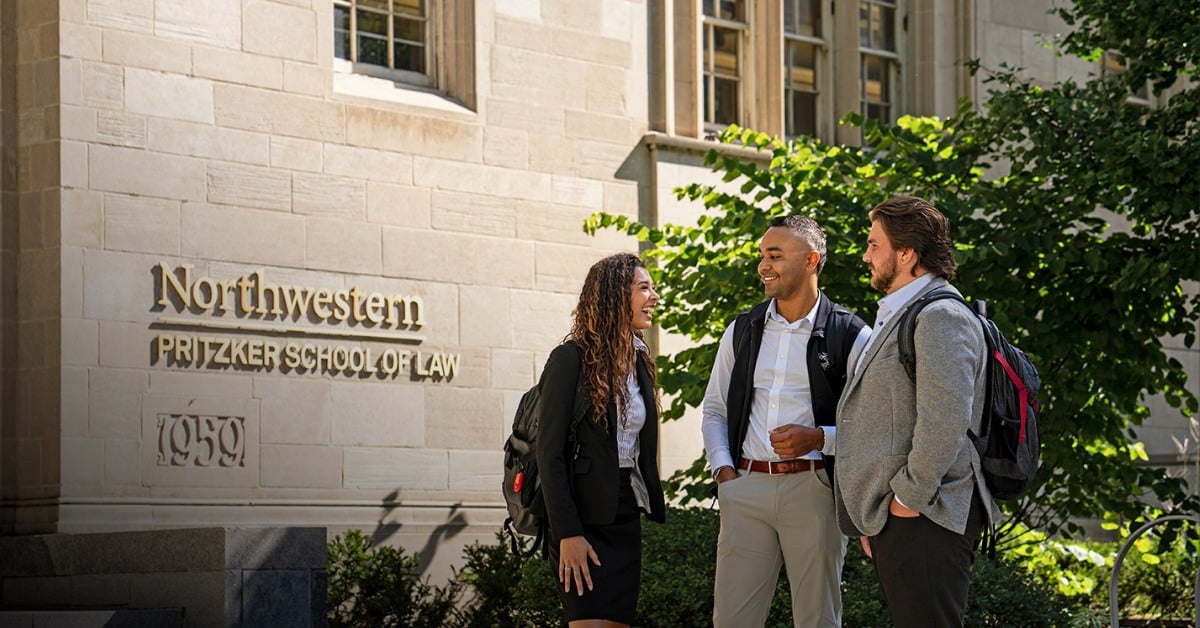
Northwestern University School of Law is a renowned private law school founded in 1949. The law school, situated in Chicago, Illinois, offers a diverse legal education. The law school offers various programs, including JD, LLM, and MSL (Master of Science in Law) degrees. The JD program is a rigorous one and requires 85 credit hours to be completed by students. Northwestern Law offers various LLM programs, including an LLM in taxation, an LLM in international human rights, and international executive LLMs. The unique MSL program combines law, business, and technology, offering flexible course plans for students. The acceptance rate for Northwestern Pritzker School of Law is 15.53%, making it highly competitive. The median LSAT score of admitted students is 172, and the median GPA is 3.92. The class size for first-year students remains small, with 248 students enrolled in the most recent year. Tuition at Northwestern Pritzker School of Law for the 2024 academic year is $76,704, reflecting a 3.24% increase from the previous year. Living costs, including housing and books, bring the total cost of attendance to approximately $99,872 annually.
Northwestern University Pritzker School of Law holds a prestigious reputation and consistently ranks among the top law schools in the United States. The law school is ranked 9th according to U.S. News and World Report. The law school’s specialty rankings include tax law (ranks No. 3), clinical training (ranks No. 5), and dispute resolution (ranks No. 7). The school is recognized for its impressive return on investment (ROI), ranking 7th overall due to its high employment rates and competitive salaries for graduates. Northwestern Law offers specialized programs that allow students to engage deeply with employment law. Key examples include courses focused on labor law, workplace discrimination, and employee benefits law. The Law School’s interdisciplinary approach, combined with its emphasis on experiential learning, enables students to gain hands-on experience. Faculty expertise in employment law at Northwestern Law is noteworthy. Professors such as Zev Eigen, who specializes in labor and employment law, bring significant scholarly and practical insights to the classroom. Professor Emily Kadens, a respected expert in business and commercial law, provides valuable perspectives on issues related to employee rights and obligations. The faculty members offer students a rich academic foundation combined with real-world applications.
Northwestern’s clinical opportunities further enhance its employment law offerings. The Bluhm Legal Clinic is an exemplary platform where students work on cases involving labor disputes, discrimination claims, and various employment-related legal matters. Another notable clinic is the Civil Litigation Center, where students represent low-income workers facing employment law issues. The clinics provide invaluable practical experience, allowing students to apply classroom knowledge to real cases. Northwestern School of Law boasts a robust network of alumni actively engaged in employment law. Alumni like Kimberly Kirn and Brad Reid, prominent practitioners in labor and employment law, regularly contribute to mentoring current students. The Labor and Employment Law Society at Northwestern provides numerous opportunities to connect with alumni through workshops, panels, and internships. Northwestern Law offers a comprehensive selection of courses related to employment law. Core offerings include “employment discrimination,” which covers federal laws governing workplace discrimination, and “labor law,” focusing on the legal aspects of union-management relations. The curriculum, in addition, includes “executive compensation” and “workplace privacy,” preparing students for the complexities of modern employment disputes. The courses, combined with interdisciplinary studies, ensure students develop a strong legal foundation in labor and employment law. Employment outcomes for Northwestern Law graduates in employment law are impressive. Several graduates secure positions at top law firms such as Morgan, Lewis & Bockius, and Weil, Gotshal & Manges, which specialize in labor and employment law.
How To Choose The Best Law School For Employment Law?
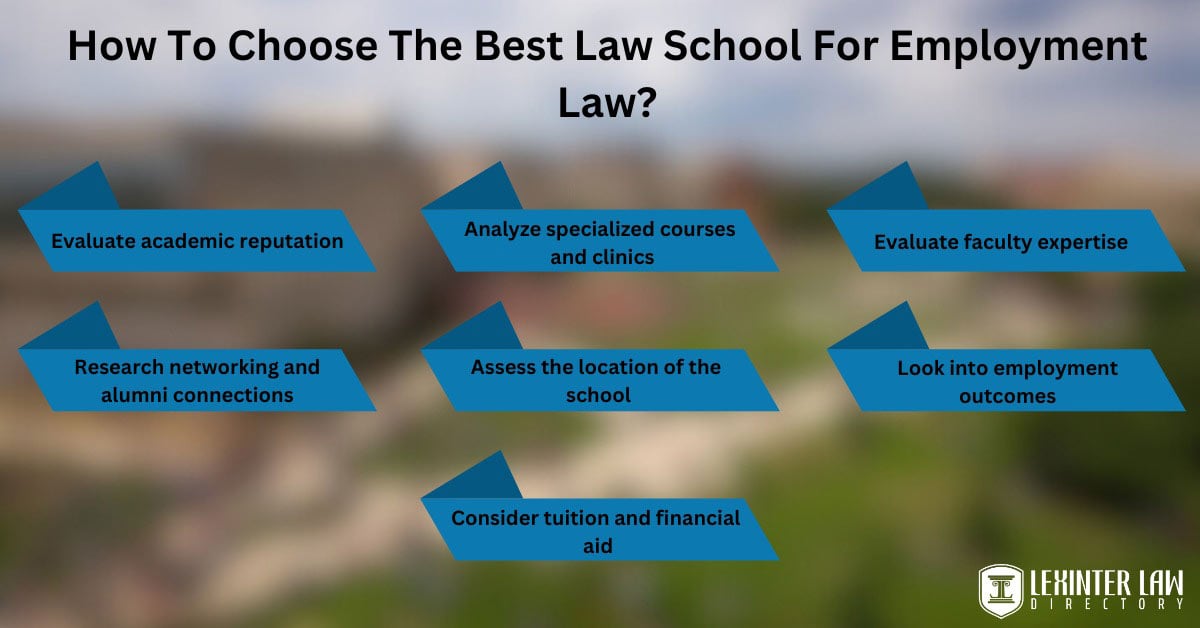
To choose the best law school for employment law, follow the seven steps listed below.
- Evaluate academic reputation. Start by considering the academic reputation of the school. Leading institutions like Harvard, Stanford, and NYU offer specialized programs that are well-regarded globally. The schools have a strong track record in producing employment law professionals and provide rigorous academic environments with comprehensive employment law curriculums. A high academic ranking in employment law means access to better resources, faculty, and career prospects.
- Analyze specialized courses and clinics. Look for schools offering specialized courses and clinics in employment law. A robust course catalog generally includes subjects like employment discrimination, labor law, and workers’ rights. Clinics provide hands-on experience in real employment law cases, such as NYU’s Employment Law Clinic or Harvard’s clinics focusing on workplace rights. Schools that offer practical learning opportunities help students gain essential skills for success in the field.
- Evaluate faculty expertise. Faculty expertise significantly shapes the quality of legal education in employment law. Law schools with highly respected professors offer students insights from seasoned practitioners and scholars in areas like labor law, workplace discrimination, and collective bargaining. Access to experienced faculty enhances the learning experience, providing students with mentorship opportunities and specialized knowledge that is critical for tackling complex legal issues in employment law.
- Research networking and alumni connections. A strong alumni network provides crucial advantages for students entering employment law. Schools like Harvard, Georgetown, and NYU boast extensive networks of alumni who work in top law firms, government agencies, and advocacy groups. The connections help students secure internships, clerkships, and full-time positions. Networking events, mentorship programs, and alumni directories facilitate building professional relationships that are instrumental in advancing legal careers.
- Assess the location of the school. The location of the law school has a direct impact on access to legal markets and job opportunities. Attending a law school in major legal hubs such as New York or Washington, D.C., offers exposure to top law firms, labor unions, and regulatory bodies. Proximity to employment law institutions increases the availability of externships and networking opportunities, making schools like NYU and Georgetown ideal choices for students interested in employment law.
- Look into employment outcomes. Strong employment outcomes are critical when selecting a law school. Schools like Harvard and NYU consistently report high job placement rates for graduates specializing in employment law. The career services departments offer robust support, including resume workshops, mock interviews, and direct connections to employers in the field. Graduates from top-tier programs secure positions at prestigious law firms or government agencies, benefiting from the school’s reputation and strong alumni network.
- Consider tuition and financial aid. The availability of financial aid is a key factor to consider when choosing a law school. Schools such as Harvard and NYU offer generous financial aid packages, including scholarships, grants, and loan forgiveness programs for public interest law students. Comparing tuition costs against potential long-term career benefits is essential, especially considering the high starting salaries associated with employment law. Financial aid significantly reduces the burden of tuition, making elite law schools more accessible to various students.
What Is Employment Law?
Employment law is the legal framework governing relationships between employers and employees. Employment law encompasses rules and regulations that protect workers’ rights while ensuring employers comply with various obligations. The law addresses the standards for working conditions, employee treatment, and compensation. Employment law focuses on balancing the power dynamics in the workplace, ensuring fair treatment, and preventing exploitation. Legal professionals with an employment law degree gain specialized knowledge in the areas, preparing them for careers in labor law, human resources, and corporate compliance.
Employment law programs cover various issues affecting employees and employers. Key areas include wage and hour regulations, employment discrimination, workplace safety, and wrongful termination. The law, in addition, extends to aspects like family leave, employee benefits, labor relations, and collective bargaining rights. Employment law aims to foster safe and equitable work environments by regulating the areas. Federal laws like the Fair Labor Standards Act (FLSA) and the Family and Medical Leave Act (FMLA) form the foundation of employment law in the United States. The laws set minimum wage standards, provide guidelines for employee leave, and ensure workplace safety. Employment law programs equip students with the knowledge to navigate the varying regulations and advocate effectively for clients.
What Is The Primary Goal Of Employment Law?
The primary goal of employment law is to regulate the relationship between employers and employees, ensuring fairness, safety, and equitable treatment in the workplace. Employment law protects workers’ rights while imposing obligations on employers to maintain safe and lawful working conditions. The legal framework addresses key issues like discrimination, wage disputes, and workplace harassment, ensuring that employees are treated fairly. Employment law serves the purpose of preventing unfair treatment in the workplace by providing a legal basis for resolving disputes between employees and employers. Laws like the Fair Labor Standards Act and the Occupational Safety and Health Act, for instance, ensure employees receive fair compensation and work in safe environments. Employment law, in addition, helps resolve conflicts through litigation or negotiation, allowing workers to assert their rights in cases of wrongful termination or harassment.
Employment law works by establishing a set of legal standards that employers and employees must follow. Government agencies like the U.S. Department of Labor and the Equal Employment Opportunity Commission enforce the laws by investigating complaints, issuing penalties, and ensuring compliance. Employment law programs educate future lawyers on how to interpret the regulations, litigate disputes, and provide legal guidance to companies and individuals facing employment-related issues.
What Is The Benefit Of Employment Law?
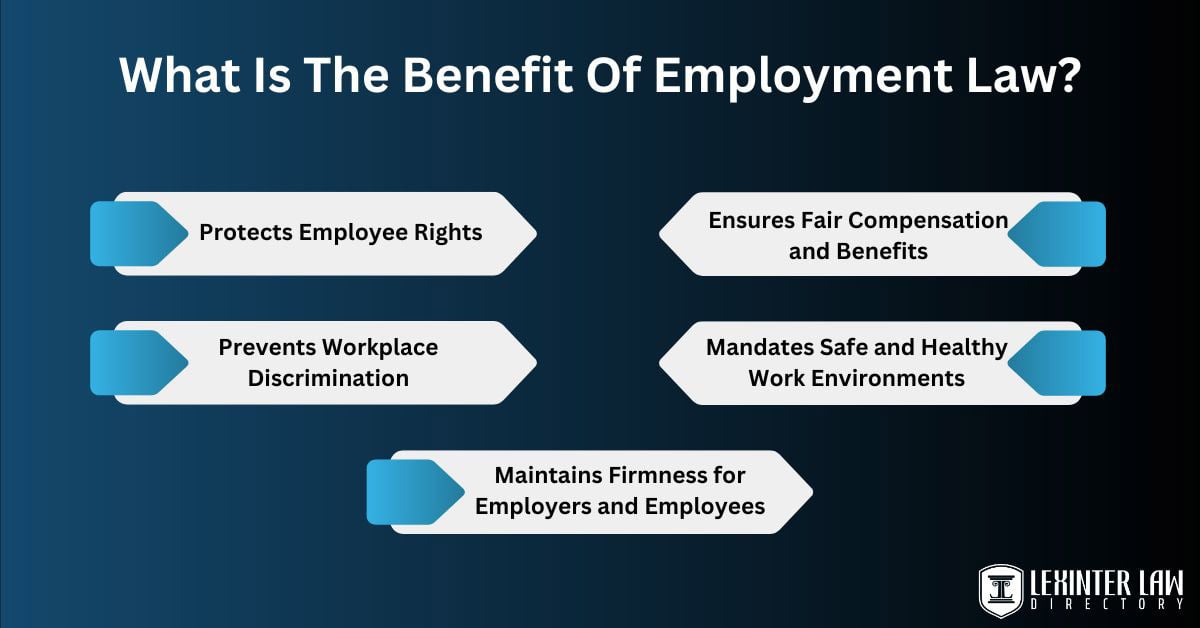
The 5 benefits of employment law are listed below.
- Protects Employee Rights: Employment law protects employees from unfair treatment, ensuring that their rights are safeguarded at work. Key protections include anti-discrimination measures, safe working conditions, and fair wages. Employees rely on employment law to address issues such as wrongful termination, harassment, or unfair labor practices. The protections create a balanced working environment where employees feel secure and supported.
- Ensures Fair Compensation and Benefits: Employment law ensures that workers receive fair wages and benefits for their work. Laws like the Fair Labor Standards Act regulate minimum wage and overtime pay and ensure that employees are paid appropriately for their labor. The law includes provisions for benefits such as health insurance and retirement plans. Employment law guarantees that workers are compensated justly, preventing exploitation by employers.
- Prevents Workplace Discrimination: Employment law plays a crucial role in preventing discrimination in hiring, promotions, and terminations. Protections are in place for employees regardless of race, gender, religion, or various personal characteristics. Laws like Title VII of the Civil Rights Act and the Americans with Disabilities Act ensure that employers maintain a fair and inclusive work environment, allowing employees to perform their duties without fear of discrimination.
- Mandates Safe and Healthy Work Environments: Employment law mandates that employers provide safe and healthy working conditions. The Occupational Safety and Health Administration (OSHA) sets strict safety standards to prevent workplace injuries and illnesses. Employers must follow the regulations to minimize hazards and protect employees from unsafe conditions. Workers file complaints if their safety is compromised, and legal action is taken against employers who fail to comply with the regulations.
- Maintains Firmness for Employers and Employees: Employment law creates stability by clearly defining the rights and obligations of employers and employees. Businesses foster trust, reduce workplace disputes, and avoid costly legal battles by adhering to the laws. Employees benefit from job security, knowing that they are protected by legal standards that promote fair treatment and stability in the workplace. The mutual understanding contributes to a productive and positive work environment.
What Is The Best Degree For Employment Law?
The best degree for employment law is the Juris Doctor (JD), as it provides the comprehensive legal foundation necessary to practice employment law. The degree equips students with the essential knowledge to navigate complex employment-related legal issues, such as labor rights, workplace discrimination, and wage disputes. Law schools like Harvard, Stanford, and NYU offer robust employment law programs within their JD degrees, providing students with coursework that covers traditional and contemporary employment law issues. Graduates with a JD are well-prepared for roles as employment lawyers, labor law specialists, and corporate legal advisors.
JD programs offer a comprehensive curriculum in labor and employment law, including foundational courses in anti-discrimination law, employee benefits, and labor relations. Various JD programs offer clinics and externships, where students gain hands-on experience in employment law cases, providing crucial preparation for future careers. Schools like Columbia and Georgetown, for instance, emphasize the legal principles and practical applications of employment law. Practical training during the JD degree ensures students are well-prepared for real-world challenges in employment law.
How To Become An Employment Lawyer?
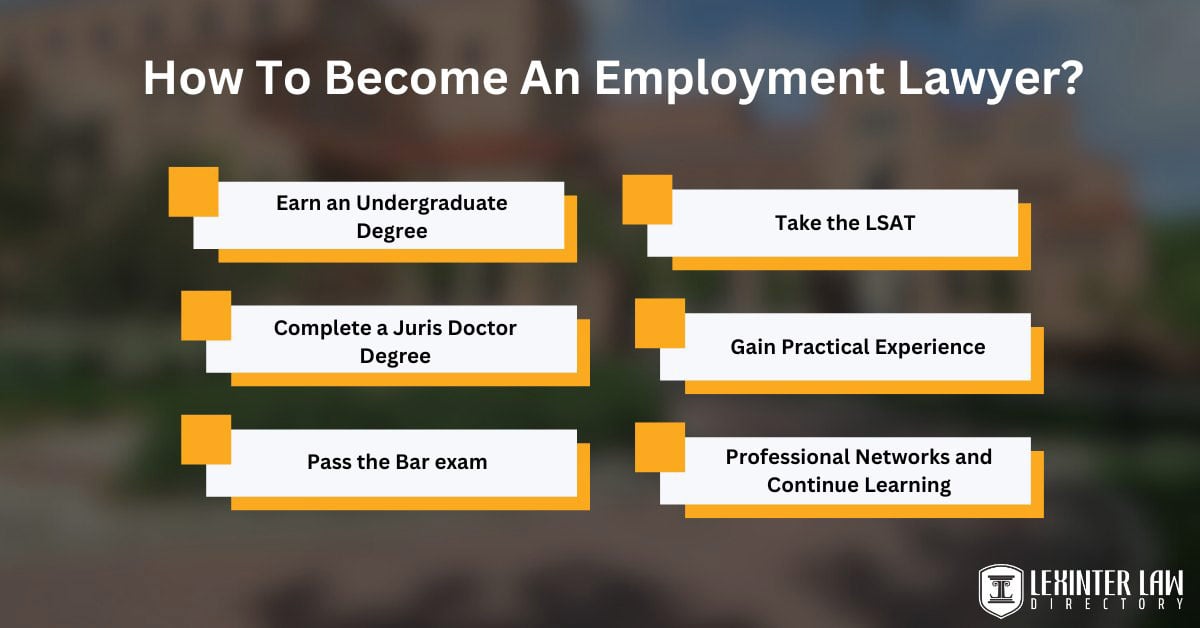
To become an employment lawyer, follow the six steps listed below.
- Earn an Undergraduate Degree. The first step to becoming an employment lawyer is obtaining a Bachelor’s degree. No specific major is required; however, students benefit from subjects that enhance critical thinking and analytical skills, such as political science, business, or psychology. Building strong reading, writing, and research abilities in undergrad helps in law school applications and further legal studies.
- Take the LSAT. Aspiring employment lawyers must take the LSAT (Law School Admission Test) after earning an employment law degree. The LSAT evaluates critical reading, logical reasoning, and analytical thinking, essential skills for succeeding in law school. A high LSAT score enhances admission prospects at law schools offering strong employment law programs.
- Complete a Juris Doctor Degree. Earning a JD degree is crucial for practicing as an employment lawyer. Students focus on foundational legal courses, and they choose electives in employment law during law school. Several law schools offer clinics or externships in employment law, giving practical experience. The JD provides theoretical and practical knowledge, preparing students for Bar exams and legal practice.
- Gain Practical Experience. Analyzing how to become an employment lawyer involves gaining practical experience and developing skills. Participating in internships, clerkships, or legal clinics during law school helps students apply theoretical knowledge in real-world legal cases. Engaging with employment law issues like wage disputes or workplace discrimination during that time is beneficial for future careers.
- Pass the Bar exam. Passing the Bar exam is mandatory for anyone aspiring to practice as an employment lawyer. Each state administers its own Bar exam, and the content varies slightly depending on the jurisdiction. Most Bar exams, however, include sections on general legal principles, state-specific laws, and a Multistate Bar Examination (MBE), which covers topics including contracts, constitutional law, and torts.
- Professional Networks and Continue Learning. Professional networking plays a significant role in building a successful employment law career. Joining organizations like the National Employment Lawyers Association (NELA) or the American Bar Association’s Section of Labor and Employment Law helps lawyers connect with peers, attend relevant seminars, and stay updated on the latest trends. The networks offer invaluable resources like job boards, mentorship, and continuing legal education (CLE) opportunities.
How Long Would It Take To Study Employment Law?
It would take approximately seven to nine years to study employment law. The timeline includes four years of undergraduate study, followed by three years in law school to earn a Juris Doctor (JD) degree. Several students major in fields such as political science or business during their undergraduate years, which helps build the critical thinking and analytical skills needed for law school. Prospective law students, moreover, prepare for the LSAT exam, which is required for law school admission.
Law school itself takes around three years if attended full-time. Students learn foundational legal subjects, such as constitutional law, torts, and contracts, during the first year. Specializing in employment law generally happens in the second and third years, where students take specialized courses in labor law, employment discrimination, and employee benefits. Aspiring employment lawyers must pass the Bar exam in the state where they wish to practice. Bar preparation generally takes a few months, and most states require candidates to pass a state-specific exam and the Multistate Bar Examination (MBE). The entire licensure process, including background checks and ethics exams, takes several months. An LLM in employment law or related certifications adds an additional year of study.
What Is The Average LSAT For Employment Law?
The average LSAT for employment law is between 160 and 165. The range is common for schools offering strong programs in labor and employment law, indicating that a score of around 160 positions applicants competitively for admission. Several top programs require scores as high as 170; however, aiming for the mid-160s helps secure admission to reputable law schools with specialized offerings. A higher LSAT score enhances admission prospects for students interested in employment law. Scoring well on the LSAT, in addition, increases the chances of receiving merit-based scholarships and financial aid, particularly for competitive employment law programs.
The LSAT, or Law School Admission Test, is a standardized test used for law school admissions in the United States and Canada. The test assesses skills in reading comprehension, analytical reasoning, and logical reasoning. Scores range from 120 to 180, with a median score of around 152. A score of 160 or higher is generally seen as a “good” LSAT score, especially for mid-tier and top-tier institutions. The LSAT score plays a critical role in law school admissions because it is a standardized measure of an applicant’s aptitude for legal study. Admissions committees use the score alongside various factors, such as GPA and work experience, to evaluate candidates holistically.
Is Employment Law Difficult?
Yes, employment law is difficult due to its dynamic and evolving nature. Employment law involves numerous federal, state, and local regulations that frequently change, requiring attorneys to stay updated on new laws and court rulings. The changes include amendments to statutes like the Fair Labor Standards Act or new rulings from the Supreme Court that impact employer-employee relationships. Employment law, moreover, is complex because it deals with emotionally charged cases, such as wrongful termination, workplace discrimination, and harassment. Lawyers must navigate legal frameworks and sensitive human issues, making each case uniquely challenging. The nature of employment litigation, which involves jury trials with unpredictable outcomes, further adds to the difficulty.
Managing cases in employment law requires deep specialization, as attorneys must handle various issues, such as contracts, benefits, and labor disputes. Specializing in the field is demanding due to the need for constant research, developing trial strategies, and balancing multiple facets of law, including contract and constitutional law. The high stakes and potential for large financial settlements, in addition, make employment law challenging. Attorneys deal with intense deadlines, confrontational opposing counsel, and demanding clients, all of which contribute to the difficulty of practicing in the field.
What Can You Expect From A Career As An Employment Lawyer?
You can expect a dynamic and intellectually stimulating environment from a career as an employment lawyer. The employment law sector involves a strong focus on people-centered legal issues. Employment lawyers frequently handle cases involving workplace disputes such as discrimination, harassment, wrongful termination, and wage violations. The work of employment lawyers directly impacts the lives of individuals, making the role impactful and highly personal. The legal landscape of employment law constantly evolves, requiring practitioners to stay current with changes in legislation and case law.
Employment lawyers must develop a diverse skill set, including strong advocacy, negotiation, and counseling abilities. The lawyers represent either employees or employers, navigating complex disputes and advising on compliance with federal and state employment regulations. The work frequently involves litigation, arbitration, and drafting legal documents, all of which require deep legal knowledge and the ability to think strategically. The fast-paced nature of the field, combined with the emotional aspects of workplace conflicts, make the career rewarding as well as challenging. Employment lawyers generally balance multiple cases with tight deadlines, and their decisions have significant impacts on their clients’ careers and well-being.
What Is The Difference Between An Employment Lawyer And A Corporate Lawyer?
The difference between an employment lawyer and a corporate lawyer is that an employment lawyer specializes in the relationship between employers and employees, whereas a corporate lawyer concentrates on corporate governance. Employment lawyers and corporate lawyers operate within different areas of law, focusing on distinct legal aspects. Employment lawyers address matters like workplace discrimination, wrongful termination, wage disputes, and compliance with labor laws. The lawyers handle litigation involving individual or collective employee rights under federal and state employment laws, such as the Fair Labor Standards Act and Title VII of the Civil Rights Act. Corporate lawyers, on the other hand, specialize in mergers and acquisitions, securities regulation, and overall business compliance. A corporate lawyer assists businesses with structuring transactions, drafting contracts, and ensuring adherence to corporate law. Business lawyers generally work with large corporations, advising boards and executives on legal responsibilities.
Comparing employment law and corporate law involves analyzing their similarities and differences. The main difference between the two laws lies in their focus. Employment law deals with the protection of employees’ rights within the workplace, while corporate law focuses on managing a company’s legal structure and operations. The two roles require legal expertise, but employment law is more people-centric, whereas corporate law involves broader business and transactional issues. Corporate law and employment law share similarities in their focus on legal compliance and the resolution of disputes. Lawyers draft contracts, review policies, and offer legal advice to prevent disputes or lawsuits in the two roles. Another similarity is that the two fields require strong negotiation skills, a deep understanding of relevant legal frameworks, and the ability to guide clients through complex legal processes.
How Do Employment Lawyers Earn?
Employment lawyers earn through bonuses, profit sharing, or working at larger firms handling class-action suits or high-stakes employment litigation. Specialized skills, such as expertise in labor disputes or union negotiations, further enhance earning potential. Law firms pay employment lawyers based on the complexity and volume of cases handled, such as workplace disputes or labor regulations. Lawyers specializing in high-profile class-action cases or advising corporations on employment compliance earn higher compensation. Employment lawyers, in addition, receive compensation through contingency fees in cases where they represent employees in claims like wrongful termination or wage disputes. The compensation means they earn a percentage of the settlement or damages awarded, which significantly increases earnings.
An employment lawyer in the United States earns around $146,502 annually on average. The figure represents the midpoint of reported salaries, but entry-level positions generally start lower, around $89,000. The experienced attorneys make upwards of $237,000 depending on the complexity of their practice and the geographical region. Salaries for employment lawyers, in addition, depend on the sector in which they work. Lawyers in major cities like San Francisco, New York, and Washington D.C. command higher salaries due to the higher cost of living and demand for legal services.
Where Do Most Employment Lawyers Work?
Most employment lawyers work in private law firms, either representing employees or management in workplace disputes. Several lawyers within firms specialize in specific employment issues like discrimination or wage disputes, handling individual cases or class-action suits. Law firms provide the structure for litigation, negotiation, and counseling services, allowing lawyers to focus on client representation. A significant portion of employment lawyers, in addition, work in-house for large corporations. The lawyers provide continuous legal advice on employment policies, compliance with labor laws, and defense in employment litigation. In-house roles involve long-term relationships with an employment law firm, where lawyers manage ongoing legal matters related to hiring practices, workplace regulations, and internal investigations.
Several employment lawyers serve in public sector roles, working for government agencies that enforce labor laws, such as the U.S. Department of Labor or the Equal Employment Opportunity Commission (EEOC). The lawyers focus on policy, regulatory compliance, and litigation on behalf of employees or the government in cases involving workplace rights. Employment lawyers, in addition, work in nonprofit organizations or advocacy groups, focusing on protecting workers’ rights. The roles involve legal aid to marginalized employees, providing representation in cases of workplace discrimination or wage theft, and advocating for stronger labor protections through policy reform.
Are Employment Lawyers Highly Paid?
Yes, employment lawyers are highly paid. Employment lawyers in the U.S. earn an average of around $87,000 to $120,000 annually, depending on experience, location, and the size of the firm. Lawyers at larger firms or in high-demand cities earn more, while lawyers at smaller firms or in rural areas generally earn less. The salary varies significantly based on geographic location. Employment lawyers in large cities such as San Francisco or New York earn over $120,000 due to the high demand for legal services and cost of living. Lawyers in smaller markets, in contrast, earn closer to $87,000 annually, which is still a competitive salary for the field.
Experience plays a crucial role in how much an employment lawyer earns as well. Senior lawyers, particularly lawyers with specialized skills in employment litigation or labor disputes, earn significantly more, reaching six-figure incomes. Large law firms, in addition, offer performance-based bonuses, adding to the overall earnings of seasoned lawyers. Employment lawyers earn substantial incomes; however, they do not reach the salary levels of corporate, patent, or trial lawyers, who dominate the higher-paying tiers in the legal industry. Employment law, despite that, remains a financially rewarding career with steady demand across different sectors.
How Can I Find Good Employment Lawyers Near Me With Lexinter?
You can find good employment lawyers near me with Lexinter by visiting the Lexinter website and navigating to the search bar. The platform allows users to search by location and legal specialty. Input a specific city or region and select “Employment Lawyer” to view available lawyers with expertise in employment-related issues. Lexinter provides comprehensive profiles for each lawyer, displaying contact details, qualifications, and practice areas. Reviewing the lawyers’ experience in employment law, such as handling cases involving workplace discrimination or contract disputes, helps in determining their suitability for specific legal needs.
Results on Lexinter are refined using filters such as lawyer ratings, reviews, and availability. The feature helps to quickly identify highly rated employment lawyers with strong reputations in resolving employment-related cases, ensuring informed decision-making. Consultations are easy to arrange directly through the platform once several potential lawyers are identified. Several profiles allow the scheduling of appointments online or offer immediate contact details, making it easier to connect with legal professionals who best fit the required legal services. Lexinter streamlines the process of finding experienced employment lawyers in various regions.

